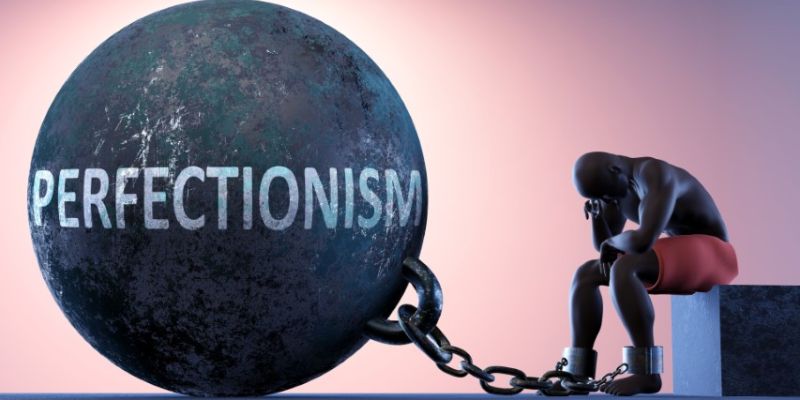In recent years, I’ve treated increasing numbers of individuals who are driven to distraction through their pursuit of perfection. The desire to be perfect traps and burdens many people and imprisons them with unrelenting stress, often creating havoc in their lives. This is a very curious thing, given that these same people believe that seeking perfection is desirable. Like many operating beliefs and assumptions, when we take a deeper look, they may appear nonsensical.
Interested in bespoke marriage and relationship counseling from Mel Schwartz? Reach out!
Perfection suggests a state of flawlessness, without any defects. To be perfect implies a condition whereby your action or performance attains a level of excellence that cannot be exceeded. Seeking perfection at a particular task might be achievable, and certainly a student can strive to attain a perfect grade or you can try to accomplish a perfect execution of something. You can hope to bowl 300 or produce a perfect report at work. You certainly hope your surgeon does a perfect job on your operation.
Yet, the goal of being perfect in life is altogether a different story. A machine or electronic device may operate perfectly — at least for a while. Yet, over time it will begin to wear down and require repair. The very notion of perfection is rooted in the paradigm of Newton’s mechanistic universe. Humans, however, were never intended to be perfect. That’s part of the definition of being human. Consider the expression, “I’m just human.”
In our culture we move relentlessly toward greater emphasis on achievement, productivity and goal attainment. We ask our children what their grade is, not what they learned. We tend to measure our lives in terms of success and achievement and lose perspective on what it may mean to live well. This tendency ruptures any sense of meaning or balance in our lives. We seem to lose the capacity for wonder and awe. Could you imagine looking at a magnificent rainbow and complaining that the width of one color was narrower than another? Not only would that be ridiculous, we’d also be ruining the splendor of the moment. And yet that is exactly what we do when we judge ourselves for our imperfections. We forget that as humans we’re part of nature, as well. As such, we would benefit if we came into acceptance of the natural flow of life, which by the way happens to be imperfect.
In truth, the notions of perfect or imperfect are simply constructs of mind and have no actual basis other than thought has created them. The notion of perfection has existed since ancient Greece, but in its more modern incarnation, it is a construct of Newton’s machine. It has no place, however, in a participatory worldview. We internalize this model of perfection and imbue upon it some intrinsic truth, and then may spend our lives wastefully pursuing that “truth.”
Ironically, if someone ever could achieve this implausible state of perfection, it’s likely that very few people would tolerate him or her. For the perfect individual would be a constant reminder to all others of their own shortcomings. Not to mention that they probably wouldn’t be much fun to be with. Who would really tolerate, let alone enjoy, being with someone who was inhumanely perfect?
When I speak on this subject –the problem with perfectionism — I find that people often protest that they are simply striving for excellence and may ask what is wrong with trying to improve. My response is – there’s no problem with that at all, if it’s done with balance. But must you always be striving to improve? If so, you are forever climbing the ladder reaching to the rung above you. You never reach your goal, there are always more rungs. So you’ll be happy when?
The paradox here is that to perpetually strive suggests that you may not be at peace and that actually impedes your forward progress. In other words, the balance that is derived from pausing from the inexorable improvement permits intuitive growth. When we experience being present in the moment, our personal evolution may vault forward. However, if we are ceaselessly pushing ourselves forward, we may actually impinge the very progress we seek. To be the “best you can be,” requires that you free yourself from being the subject of your onerous demands. The over emphasis on a highly productive life is reminiscent of Newton’s machine-like ideology. Machines are intended to be productive. Humans are designed in much more complex ways, in which productivity is an important part, but not the entirety of our purpose.
American culture is driven toward excellence and the mantra of doing the best you can requires a deeper examination. If we always value performance over tranquility or being present, we are sacrificing balance and a core value of what it means to be human. Emotional intelligence and relatedness may be sacrificed in the pursuit of excellence. A life well lived would necessitate a harmony of excellence, joyfulness, relatedness and peace of mind. When one element obscures another, a lack of equilibrium sets in.
A Mask for Insecurity
I have often counseled people who were beleaguered by their need to be perfect. I have come to learn that their pursuit of perfection is really a disguise for their insecurity. It becomes a statement that I’m not good enough just as I am. When we do that, we judge ourselves.
Usually we strive toward being perfect to compensate for a sense of inadequacy. People who want to be perfect usually have an exaggerated sense of their own shortcomings. They typically received messages earlier in life that they weren’t good enough. So they decided that only by being perfect would they be beyond reproach. With such an affliction we might look at perfectionism as a compensation for earlier life experiences –wave collapses — that corrupted someone’s well-being and self-esteem. As a compensatory response, the drive toward perfection is erroneously sought as a solution. Perfectionists tend to think that other people are somehow better or superior to them, so they need to be without flaw just to catch up. This is a terribly damaging myth.
Individuals who seek perfection are more sensitive to the judgments of others. In fact, these judgments are most often imagined. Everyone has an opinion, but elevating someone else’s opinion to the status of being a judge is really silly. After all, someone else can’t really judge you unless you confer upon him or her, the power of being a judge.
The only perfection is in being present, yet the perfectionist is never present
The closest thing to perfection is in the ability to be fully present. Without any distracting thoughts measuring or grading ourselves, we’re free to really be in the moment. It’s in that moment that we’re truly alive. Yet, the perfectionist isn’t typically present as they’re either busy critiquing the past and replaying their every decision or worrying about their future decisions. So you see the perfectionist is never really present. Isn’t that ironic?
The pursuit of perfection limits our ability to be present and literally robs us of the vitality of life. It is unachievable, unimaginable and frankly undesirable, so why pursue it? Your time would be far better spent in delving into how to transcend the insecurity that catalyzed the desire for perfection in the first place.
Analyzing, measuring and judging are the tools of the perfectionist. We might recall that these are the central tenets of Newton’s paradigm and as such we can see that perfectionism is symptomatic of that tired worldview.
Do not measure thyself!
In my work as a psychotherapist I often see individuals who are plagued by a relentless measuring of themselves. These people carry on an internal dialogue whereby their critical voice is enslaving, as they feel compelled to judge and measure most aspects of their lives. In such circumstances, these individuals rarely get to be present. Even when in conversation with others, they are only partly there, for a more private aspect is carrying on a self-critique at the same time. Their self-critical voice is embedded in a very deep and predictable groove.
Sometimes I learn that the inner dialogue actually speaks in the second person. Rather than speaking in the first person –“I” — the voice speaks even more critically by saying “You.” Rather than the thought, “I shouldn’t have done that,” you may say, “How could you have done that?” When this occurs I inquire as to who is actually speaking. There is literally a measuring voice in many people that becomes the critical second party. Sometimes this simply replicates the childhood experience of the critical parent. The greater problem is that the victim of the childhood abuse integrates the measuring voice as his or her own! I have never encountered the third person voice speaking approvingly to one’s self — only critically.
You can’t be in two places at the same time (except in cases of quantum entanglement) and you can’t engage two thoughts simultaneously. Every moment in which you measure or judge yourself is a moment you didn’t choose a better and healthier option. The state of potential is never reached. Peacefulness and mindfulness are never reached for the analyzing, measuring voice never relents. These are missed moments of valuable life experiences. If a significant percentage of your thoughts are self-critical, then indeed you have scripted that life experience for yourself. You are missing the rich experience of joyful life.
Just think about how this impacts your relationships. If you’re not present for yourself, how can you be for another? This is ruinous for relating to others. If you feel perturbed by your own discontent, it has untold consequences for your relations with others.
Learning how to liberate yourself from this groove of negativity is altogether achievable once you set the intention. The techniques described in my posts, “Stuck in the Groove,” and “Breaking Free from the Comfort Zone,” illuminate the method for coming out of the groove of old thoughts and feelings.
As a baseball fan, I’ve often been curious about those who sit in the stands with pencil and scorecard in hand. They make note of most every transaction of the game — a measuring if you will. Yet they miss the poetic elegance and flow of the game. If you measure yourself, you’ll miss out on the flow of life.
I’m not, however, proposing an anything goes attitude. There is a vast difference between the measuring analysis of our thoughts or a reflective self-evaluation. Evaluating is a gentler, and a subtler checking in, whereas the measuring makes a much deeper and incisive cut into the fabric of our being. Such measuring ruptures the integrity of our life experience and severs our greater participation in and with life. You cannot engage in the flow of life if you are mired in analytical self-measurement.
Listen to my recent Possibility Podcast, The Problem With Perfection.
Please be sure to “like” my Facebook page to see my quote of the day, follow me on Twitter, and join my LinkedIn network.





Just read your article on Perfectionsism and would like your permission to quote from it in my Sunday blog, A PSYCHOTHERAPIST’S JOURNEY (named Top Blogger in the field of Mental Health by Wellsphere).
I’m between patients at the moment and don’t have time to look you up and read about you … so, forgive me for not knowing this, but, if you haven’t authored a book, you should.
Your writing is clear and flows beautifully … and your points (though I disagree with only a few) are very well presented.
Again, please let me know if I have your permission to quote you (probably this Sunday or the one following).
Yours,
Linda Appleman Shapiro
Psychotherapist, Addictions Counselor, Oral Historian, Lecturer, Author
Website: http://www.applemanshapiro.com
Author: FOUR ROOMS, UPSTAIRS: A Psychotherapist’s Journey Into and
Beyond Her Mother’s Mental Illness (and soon to be released
second book)
blog: A Psychotherapist’s Journey @beyondatrauma.blogspot.com
e-mail: beyondatrauma@gmail.com
My pleasure Linda.
I have authored The Art of Intimacy, The Pleasure of Passion and am currently writing A Shift of Mind.
thanks,
Mel
An insightful article linking perfectionism to being present in the moment. I will pass it on.
I have read that there is no real cure for “perfectionism”. We can work on it and be aware of it and instead aim to being an “optimalist” rather than a “perfectionist”. What do you think – do you have any practical tips or applications to eliminate or reduce perfectionism?
Hi Eric,
I’ve had some good success helping people with this affliction by teaching them a mastery of thought. It’s part of my Emergent Thinking process. I utilize techniques from the field of quantum physics and enable people to see the analyzing, judging thought as habitual and assist them in breaking free of its hold. If you’d like to know more please send me an email and I’ll describe in more detail or read my article on Emergent Thinking..thanks
Hi Mel
It’s enriching to read your article as I spend considerable amount of time with aspiring and nascent entrepreneurs, guiding their early movement within new business start-ups. We use an entrepreneur profiling tool, Entrepreneur Scan (or E-Scan) to establish motivations, characteristics and thinking styles.
One of the key motivators and characteristics is Need for Achievement, which quite often reveals ‘perfectionist’ traits for the entrepreneur. When holding conversations with the ‘perfectionist’ entrepreneur it usually reveals startling information which is a lesson to all those people starting of growing businesses.
They procrastinate ‘waiting until…’ which means lots of unnecessary delays to getting things done. They spend so much time polishing their activity it becomes an obsession and usually means further delay or refusal to accept that the customer might be willing to buy products or services that are ‘flawed’. At times they feel very unfulfilled because as you say they ‘are more sensitive to the judgements of others’ and feel very disappointed if the feedback they get is not superb.
So we offer something simple to assist in removing the stress. We suggest replacing ‘perfection’ with ‘excellence’. Never getting to an infinite goal becomes something that is achievable, every day. The empty feeling of under achievement goes, with new constant replenishment of continual achievement becoming a source of putting in good feelings of self worth and reward. Excellence is based upon the premise of achieving the best possible action, considering the timescales and current knowledge with the caveat that you can improve upon it and move the bar up, the more experience you gain. Over time ‘excellence’ speeds up, increases confidence and becomes the new ‘perfect’.
It really has helped people to move forward, as business owners and more importantly as people and the summarising factor is that frowns get replaced by smiles!
Thanks for sharing Gary! Very helpful.
I agree that perfectionism is a cover for some kind of insecurity. Mostly because that’s why I do it. Sometimes it’s a veil to cover up your flaws because you want to be seen as better than the people you know. Sometimes you assume that because someone presents a perfect ‘front’ that it’s true and you will not be seen as less successful, pretty, organized, caring, etc. than that person. If you were considered sub-par by parents/loved ones, you have a constant need to earn their approval (which will never happen), if you were considered perfect as a child or in school, you have unnatural expectations for yourself. That is why as students who were the best in younger grades move up and out in to bigger communities such as high school or college they find that there are many other just like them and some that are even better. This need to prove ones self can cause considerable stress and if taken too seriously or into too many aspects of ones life makes that person very unlikable.
Hi Sarah,
I believe that what you describe is tantamount to what I call other-esteem. Rather than building our authentic self, we fake it so to speak and try to present an image of our selves that we think others will approve of. In so doing, we betray our own self and denigrate genuine self-esteem.
Yes Sarah, I very much agree. We might look at perfectionism as a coping mechanism created to buffer our younger self from criticism if not scorn. But decades later this coping mechanism becomes a terrible burden. You might want to read my post, Coming into Balance, which speaks to this process.
Hello Mel,
Congratulations and thank you for sharing this interesting text and very full of thoughts. I understand that everything could be connected as you said …. since the Mithos perfection ( literally means “a finishing”, and “Completeness”) of Greek gods even today with unreal women in magazines, with princes and princesses and happily ever after like a fairy tale… Sometimes trying to be perfect just shows our arrogance and our humanity… “Martin Luther King, Jr. said that Gandhi criticized himself and whenever he made a mistake, he would confess it publicly. Here was a man who would say to his people, I’m not perfect, I’m not infallible. Gandhi was considered a great man for this quality of humility. When we confess our weaknesses or imperfections we make ourselves more vulnerable. We open ourselves and are thus able to grow through the confrontation with that which is most weak or negative in us. Arrogance is the opposite of vulnerability; it represents a closeness of mind and usually, a selfishness of purpose (…) ” The Insanity of Arrogance – Mark A. Sircus
Have a great day!
Many Thanks 😉
The paradox is that being comfortable with our vulnerability is indeed strong.